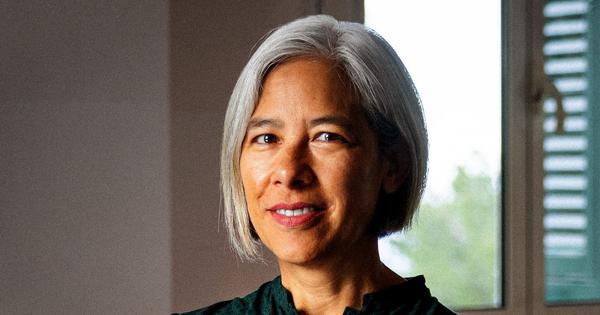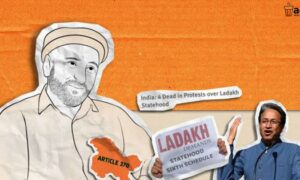
Susan Choi’s Booker-shortlisted sixth novel, Flashlight, first came to life as a short story in The New Yorker in 2020. Appropriately enough for a narrative that found its genesis during the chaos, the isolation, the punishing heartbreak of the Covid pandemic, Flashlight, in this novel form, turns into a story of fragmented families, disappointing relationships, unresolved trauma, and, defiant of the irrevocability of loss, a nebulous, spectral hope.
It starts as a memory, unspooling in the present, of ten-year-old Louisa and her father, Serk Kang, walking the shore while her mother, Anne, was “shut inside the small almost-waterfront house they are renting, most likely in bed.” The child’s preference for her father and, as an almost corollary, her impatience with her invalid mother are established in a sharp, short scene, where father and child walk into the water. He, indulgent, in his rolled-up slacks and his hard, polished shoes, carrying a flashlight she deems as unnecessary as his protective gesture of holding her hand; she, exuberant at having convinced him to accompany her on this nighttime adventure.
With an abruptness that often marks the unreliability of memory, the reader is plunged into the darkness of Louisa’s life after the loss of her father. Casual acts of cruelty against her mother, disdain for the aunt who had taken them in after the tragedy, and the performative self-assurance of a child who has not learnt to process her grief, all set the tone for the decades of conflict between mother and daughter that the novel uses as its central framework, raising within it the complex architecture of transnational politics and palimpsestic identities.
Three generations
At an intimidating 464 pages, Flashlight is a bit of a doorstopper. Understandably so, since it takes on the onerous task of reconstructing the history of three generations of the Kang family, dislocated, temporally and geographically, between Korea, Japan, America, and China. Serk, when he first meets Anne, is pursuing a doctorate in electrical engineering at the
University of Massachusetts. To Anne, he was “a person not drawn with pen and ink but moulded with a knife from hard clay.” Born in Japan to parents who were forced to leave the war-ravaged island of Jeju in Korea, for the relative safety of Japan, Serk grows up unaware of being Korean; perhaps, more importantly, unaware of being not-Japanese. His parents, in conformity with Japan’s colonising strategy of the erasure of the Korean language and Korean culture, give him the Japanese-sounding name of Hiroshi, only to remind him, at the end of the Second World War, with the declaration of the independence of Korea, that his name, his “real” name, was Seok. Bound to the idea of an atavistic homeland, his parents decide to move to the Democratic People’s Republic of North Korea (DPRK) in response to propagandist overtures made by the newly formed government to people of Korean origin.
Choosing to immigrate to America instead, Seok finds himself in another involuntary transition, becoming “Serk”, easier for the American tongue to pronounce. In the process of these shifts of name, and concomitantly, identity, Serk begins to inhabit a place of un-belonging. A Permanent Resident Alien in Japan, he becomes a passport-less Green Card holder in America, and, in the course of a professional exchange with a university in Japan, transforms right back into the Japanese-presenting, non-assimilated, too-tall, English-speaking alien in the country of his birth. Identity is hybrid only when you hold power, Choi seems to say. When you do not, your identity is whatever those you answer to allow you to have.
A significant (later) part of the book is an excoriating display of the excesses of autocratic regimes that have brainwashed/browbeaten their citizens into uncomplaining, uncritical compliance (any resemblance to similar behaviour closer to home is purely coincidental, of course), but, the pulse of Choi’s story, informed as the rest of it might be by identity and race politics, belongs to the relationships between its flawed, often unlikeable cast. The family, a stable unit of social transaction since the emergence of the novel form, is now the destabilising force. About midway through the narrative, Choi delivers a surprise, one that fits neatly within Louisa’s assessment of her parents as people for whom things always go wrong, not in a comic, fresh-off-the-boat escapades sort of way, but in all earnestness, their best attempts failing, the inevitability of tragedy coding their lives.
With unnerving honesty, the narrative captures the push and pull between Anne and Louisa, friction that grows worse with time, as Louisa distances herself more and more from her past, rejecting all Anne’s attempts at introducing her to her father’s heritage, refusing to accept Tobias, Anne’s son from an ill-advised relationship when she was a callow nineteen. Tobias, born of two White, all-American parents, finds himself drawn to the East, spending all his life in Japan and thereabouts, integrating within its culture.
Louisa, despite her biological connection to Korea, her osmotic acquisition of the Japanese language in the one year she was made to spend in the country, finds herself the eternal outsider, whether in America or in Japan. The purported drowning of her father on the evening of their beach excursion changes everything in Louisa’s life, locking her in permanent patterns of resentment, defiance, and poor decisions. Her mother, with her multiple sclerosis, has “hateful hands” that cannot accomplish even simple tasks, her aunt “was like a bright light Louisa couldn’t turn off”; her friends ask too many questions; her half-brother is annoying in his likeability. Her father’s death is an act of abandonment she cannot stop raging over. Grief, the novel seems to say, is irrational and inexplicable, capable of turning affection to cruelty, empathy to aversion. Choi’s novel, in its exploration of the vulnerabilities of her protagonists, illuminates this unrelenting ugliness of grief.
Shadows and illumination
The story it tells is compelling, particularly at a time when governmental control over individual choices, excessive censorship, and attacks on personal liberty are becoming de jure in supposed democracies, but Flashlight’s place on the awards circuit should be ascribed equally to its reflective prose that allows the novel to lay bare that awful tragedy of modern-day existence – the horror of “normal life turning strange”. As a child, Louisa witnesses the volatile disagreements between her parents and learns, too early in life, that the “ordinary daylit American world of moms, dads, and kids” that she sees in the movies her father takes her to is a thing to be frightened of. Having forgotten the exact circumstances of her father’s disappearance, she grapples with the fragility of memory, often associating “remembered” events with tactile experiences – the feel of sand between her toes, the soft thump of a falling object connecting with the ground, the sound of words heard- only to question the veracity of her remembrance.
“It was often this way”, she reminds herself. “What had actually happened and what she could imagine had happened were equally vivid. She would not just forget which was which but why it mattered to know.” Beginning, perhaps, to unburden herself of her imagined culpability in her father’s disappearance, she asks: “Are events that are forgotten by all the participants, or that weren’t admitted to cognition in the first place, something other than events, or are they nothing? Do the witnesses make the event?” Choi’s prose embraces the disconcerting, mirroring in its structure the uncertainties and disjunctions of the characters who live in its pages.
Why, though, does a novel about a dysfunctional American family, the geopolitical tensions of East Asian countries, the double exile of a man of Korean ethnicity born in Japan and fed the grandiosity of the American Dream, a girl who grows up in the shadow of the loss of her father, squandering away the promise of success he saw in her, a “fiercely besotted” father who will make every sacrifice for the well-being of his child, a woman whose disability goes unrecognised for years, and, briefly, families in Japan and South Korea searching for their disappeared loved ones amid a political storm, call itself Flashlight? There are, like disjointed clues (or red herrings), literal flashlights hiding in unusual spaces – a psychologist’s chamber, an interrogation room, a European hostel séance, a fragment of a memory – but the answer might be deceptively simple, lurking somewhere between shadows and illumination, waiting for the reader to discover the familiar made strange.
Flashlight, Susan Choi, Vintage.
📰 Crime Today News is proudly sponsored by DRYFRUIT & CO – A Brand by eFabby Global LLC
Design & Developed by Yes Mom Hosting






